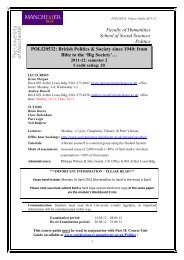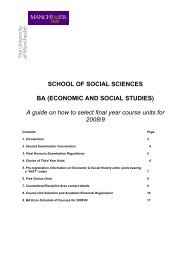CHNN 22, Spring 2008 - School of Social Sciences
CHNN 22, Spring 2008 - School of Social Sciences
CHNN 22, Spring 2008 - School of Social Sciences
Create successful ePaper yourself
Turn your PDF publications into a flip-book with our unique Google optimized e-Paper software.
direction and this reinforced my decision that I should stay on, although I was well aware <strong>of</strong> a lot <strong>of</strong><br />
things still being wrong. I always retained good personal relations with the people like Christopher<br />
Hill who left, which was not a typical position as far as the party was concerned. People on <strong>Social</strong>ist<br />
Register like Ralph Miliband and John Saville were personal friends over the years; similarly with<br />
the New Left Review, people like Robin Blackburn and Perry Anderson. I was never tempted to<br />
join the trotskyists. I was much more favourable to the trotskyists in the ’45 period, when the<br />
communist party made right-wing errors. By the ‘56-’57 period, in which the trotskyists were<br />
recruiting a certain number <strong>of</strong> people, I never felt any inclination to join them.<br />
For a job I began lecturing in a college in South East London. Politically, I took part in some <strong>of</strong> the<br />
‘new left’ events. I was blocked from having anything serious published in the party press. After the<br />
twenty-first congress <strong>of</strong> the CPSU, which Gordon McLennan was one <strong>of</strong> the delegates at, and wrote<br />
an enthusiastic article about, I contributed an article for Marxism Today in which I was much<br />
more critical and they refused to publish it. There was a big hoo-ha that went right up to the level <strong>of</strong><br />
Gollan, but they still refused to publish it; whereas New Left Review, for instance, published my<br />
stuff. So it was an anomalous position where I was a party member but the party journals wouldn’t<br />
publish my stuff, but the New Left and other things like <strong>Social</strong>ist Register did publish my stuff. I<br />
did make a point <strong>of</strong> not criticising the current policies <strong>of</strong> the communist party in New Left Review<br />
and so on. Historically, when I did a review <strong>of</strong> Macfarlane’s book on the communist party in the<br />
1920s, <strong>of</strong> course I was critical <strong>of</strong> the communist party’s line in the 1920s; but nobody could do<br />
much about that, because that would mean that they would have to defend the third period line<br />
themselves, which they obviously couldn’t do. But I made a point in the non-party press – New Left<br />
Review, Tribune, things like <strong>Social</strong>ist Register – <strong>of</strong> not making a specific attack on the current<br />
policies <strong>of</strong> the communist party, which denied them a handle to get me out on the basis <strong>of</strong> that. I<br />
was anxious to stay in because I still retained this perspective that sooner or later it would be<br />
possible to change. You asked what would have been my alternative if I’d been outside <strong>of</strong> the<br />
communist party. Precisely because I didn’t think there was any particularly viable alternative, I<br />
stayed in. At communist party congresses I used to sometimes be a lone voice with resolutions from<br />
my own branch.<br />
T<br />
his continued until ’67-’68, when I was rehabilitated in practice. A number <strong>of</strong> things<br />
happened. First <strong>of</strong> all there was the Czechoslovak business, the initiation <strong>of</strong> the Dubcek<br />
line. Alongside <strong>of</strong> that, with the imprisonment <strong>of</strong> dissidents in the Soviet Union Gollan<br />
actually made a critical comment much closer to the positions that I had taken. So I was then<br />
invited to come onto the national cultural committee <strong>of</strong> the party; I was invited to do education<br />
classes at district schools. Already in October 1967 there was a programme on Daniel and<br />
Sinyavsky on the BBC and there was a late-night line-up thing afterwards, in which I was asked to<br />
participate. Gollan had publicly criticised the condemnation <strong>of</strong> Daniel and Sinyavsky, so before I<br />
went on the programme I rang him up and said, ‘Listen Johnny, are you prepared to let me say that<br />
you still hold to your position.’ He said, ‘Yes, I’ll work out a form <strong>of</strong> words that you can work into<br />
your contribution to the programme’. The Guardian then published a thing referring to this and<br />
saying that they had checked with King Street and that Mr John Gollan had said that what Mr<br />
Monty Johnstone said in that programme was said with his full knowledge and approval. Well at<br />
that stage, <strong>of</strong> course, a lot <strong>of</strong> people in the communist party were saying, ‘What the bloody hell is<br />
happening? This revisionist bastard who [we] wanted to keep away from everything is coming and<br />
making statements on behalf <strong>of</strong> the communist party leadership.’ This was the beginning <strong>of</strong> a<br />
certain rehabilitation as far as I was concerned.<br />
I could argue within the party, and did argue within the party at congresses and in pre-congress<br />
discussions. I helped to argue and got my branch to support resolutions on a whole number <strong>of</strong><br />
issues, which included also the Sino-Soviet dispute. But I couldn’t develop these things in the party<br />
press at any length until ’68. After ’68 that changed and they were prepared to publish the stuff; in<br />
fact they published a pretty long article <strong>of</strong> mine which ran to three issues <strong>of</strong> Marxism Today on<br />
socialism, democracy and a one-party state. This then initiated a big discussion in which I was<br />
attacked with bell, book and candle by all the hardliners, and then was able to reply in a subsequent<br />
issue. That went on till ’72, I think, that particular discussion. The national cultural committee later<br />
became the theory and ideology committee, and I was able to play a certain role over the years.<br />
The invasion <strong>of</strong> Czechoslovakia on 21 August 1968 actually pushed the issue right into the<br />
31
















